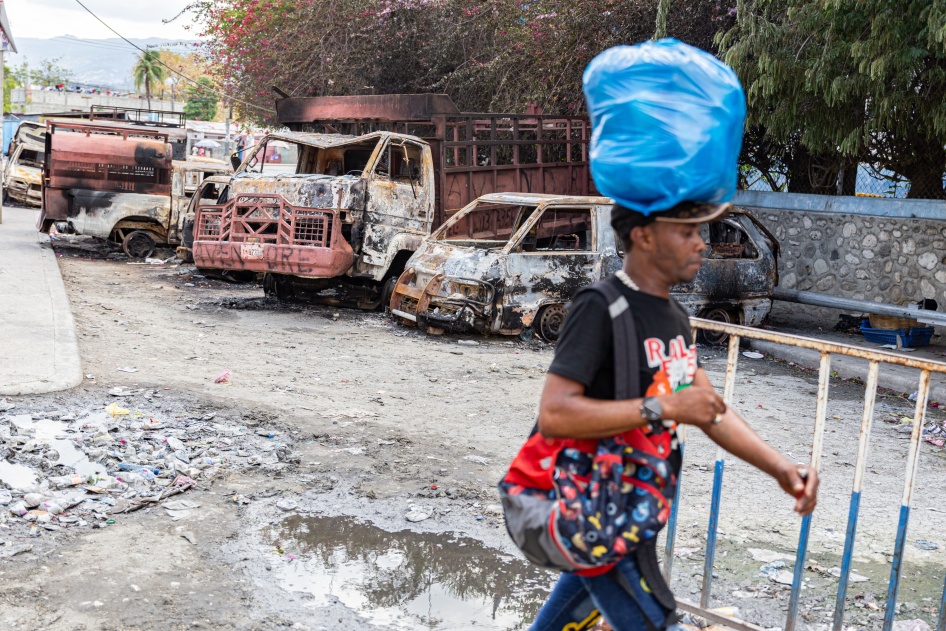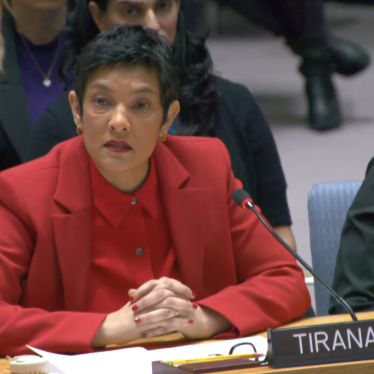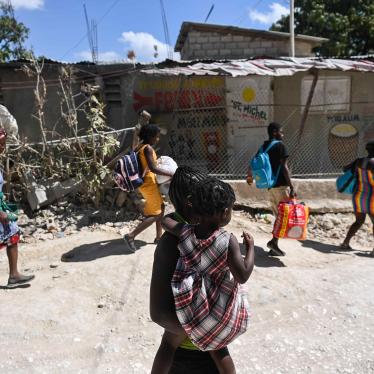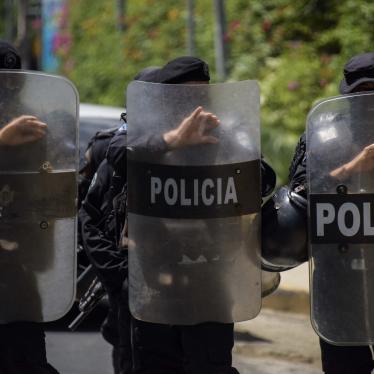(Washington, DC) – Haiti is on the brink of a total collapse or takeover of the state as violent criminal groups seeking to overthrow the government have attacked police officers and state institutions, including prisons, Human Rights Watch said today. The groups’ actions have brought economic activity, the delivery of life-saving humanitarian assistance, and nearly all transportation, including the country’s main port and international airport, to a near standstill.
“With Haiti on the cusp of even greater chaos and violence, it is more urgent than ever for regional and international partners to support Haitians’ calls for a rights-based international response that addresses all aspects of the crisis,” said Nathalye Cotrino, crisis and conflict researcher at Human Rights Watch. “This should include an international support mission that complies fully with human rights and the formation of a transitional government that can work with partners to restore basic security, democratic governance, access to necessities, and the rule of law.”
In October 2023, the United Nations Security Council authorized a Multinational Security Support mission to provide operational support and training for the Haitian National Police, though it has yet to deploy to Haiti.
Criminal groups, which control much of the country, including nearly all of the capital, Port-au-Prince, have killed over 1,100 people and injured nearly 700 others just since the start of 2024, according to the UN. Nearly 13,000 people were killed, injured, and kidnapped by criminal groups between January 2022 and early March 2024. Thousands of women and children have been victims of sexual violence and over 362,000 people have been internally displaced. The rates of food insecurity in Haiti are among the worst in the world. Many children are out of school, and child use and recruitment by criminal groups are on the rise.
“We are abandoned to our own fate; nothing works in the country,” a 23-year-old mechanic in Port-au-Prince told Human Rights Watch by phone on February 19. “There is no state, the police are scared, and they have no way to defend us from the gangs that shoot, kill, kidnap, rape women, and take away everything from us on a daily basis.”
Protests broke out across Haiti after Prime Minister Ariel Henry, who took over after the president was killed, failed to organize elections and step down by February 7, 2024, under the December 2022 agreement between political and civil society actors. Many Haitians see Henry as heading an illegitimate and corrupt government with alleged links to criminal groups.
Haitian human rights and civil society groups have called for Haiti’s international partners, especially the United States, to stop propping up Henry’s government. They have pressed other governments to support the formation of a transitional government led by technocrats untainted by allegations of involvement in corruption or support for abusive criminal groups who would also promise not to participate in future elections. The transitional authorities could then work to create an environment that will allow for the organization of free, fair, and credible elections within a clearly defined timetable, Haitian civil society groups have said.
Talks facilitated by leaders from the Caribbean Community (CARICOM) to address the country’s political stalemate have stalled for more than a year because Henry and other key actors have not reached a consensus. Some political parties proposed a new government that would include a role for Guy Philippe, a former police commander-turned-coup instigator. Since Philippe returned to Haiti in late November 2023 after serving six years in a US prison on money laundering and drug charges, he has mobilized shutdowns and street protests around the country and appears to have garnered the support of members of the heavily armed Protected Areas Security Brigade, a government force tasked with providing security to Haiti’s environmentally protected areas.
Civil society groups have raised concerns about the proposal and fear that such a government would not address the country’s underlying problems. “Individuals, groups and political parties involved in criminal practices ... should not be part of the transitional government, whose members must be above suspicion,” said Vélina Élysée Charlier, a member of the Haitian Noupapdòmi collective, which fights corruption and impunity.
Henry has not returned to Haiti since he traveled to Kenya on February 29 to finalize arrangements for the deployment of the Kenyan-led international security support mission. That same day, Jimmy Chérizier (also known as “Barbecue”), the leader of Haiti’s main criminal coalition, known as G9, announced the resumption of a joint initiative with the rival G-Pèp coalition called “Viv Ansanm” (“living together” in Creole), with the stated goal of removing Henry from power and confronting the support mission.
Members of criminal groups have since attacked two major prisons, resulting in the release of nearly 4,700 people, forced the closure of the main international airport, and attacked the main port and state offices and several police stations, with enormous human and material losses, as reported by the Haitian National Human Rights Defense Network. The increased insecurity has severely disrupted business, transportation, and the delivery of humanitarian aid, further limiting the already restricted access of Haitians to essential goods and services. Basic access to water and health care is also threatened.
Amid this chaos, Henry has not spoken publicly about the latest events in the country.
The US government appears to have increased its pressure on Henry and support for a transition in recent days, with the US ambassador to the UN, Linda Thomas-Greenfield, saying on March 6 that the US government had asked Prime Minister Henry to “move forward on a political process that will lead to the establishment of a presidential transitional council that will lead to elections,” adding “that it’s urgent that he moves forward in that direction and start the process of bringing normalcy back to the people of Haiti.” A US State Department spokesperson said that US Secretary Antony Blinken spoke with Henry on March 7, expressing support for CARICOM and Haitian stakeholders’ proposal “to expedite a political transition through the creation of a broad-based, independent presidential college to steer the country toward the deployment of a Multinational Security Support mission and free and fair elections.”
Meanwhile, legal, funding, and operational problems continue to stall the deployment of the support mission, though Kenya and Haiti signed a bilateral agreement on March 1. Pledges of support have come from the US, Canada, and France. Benin, Chad, Bangladesh, Barbados and The Bahamas have committed to deploying forces alongside Kenyan police officers.
In a March 6 statement, UN high commissioner for human rights, Volker Türk, reiterated his call “for the urgent deployment, with no further delay” of the mission. “The reality is that, in the current context, there is no realistic alternative available to protect lives,” he said. “We are simply running out of time.”
To avoid repeating failures of past interventions in Haiti, governments should ensure that troop-contributing countries and donors enforce a human rights due diligence policy that is at least as rigorous as that which the UN applies to its peacekeeping missions, Human Rights Watch said.
“The country is falling apart,” a senior police official, who asked to remain anonymous, told Human Rights Watch by phone on March 7. “There is no state authority left; the authorities now are the criminals ... The police lack sufficient officers, equipment or technology to protect people. That is why we need international support, we cannot fight them alone.”
Rosy Auguste Ducéna, a Haitian human rights activist from the Haitian National Human Rights Defense Network, also underscored the need for a rights-based international response: “What is happening today was foreseeable and, above all, avoidable. To avoid a worsening of the situation, more than ever, the international community must listen to the Haitian people.”
The US, Canada, France, and other governments should redouble their efforts to immediately provide the necessary funding for the functioning of an international support mission that includes human rights due diligence for its personnel and human rights monitoring. They should also engage more effectively with Haitian civil society and other key stakeholders to support the establishment of a transitional government that can work with an international mission to re-establish a minimum level of security and avoid a further deterioration of humanitarian conditions.
“Governments committed to human rights and democracy should act now to support Haitian efforts to restore security and avoid a situation where a power vacuum is exploited by criminal actors who are likely to perpetuate the cycles of violence and abuse,” Cotrino said. “All stakeholders should work with Haitian civil society, building on their proposals to restore the rule of law, security, and access to basic necessities, with a view toward true democratic governance while avoiding the mistakes of past abusive international interventions.”







